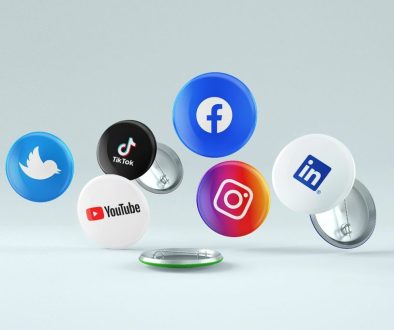Business Owners Think They Don’t Need a Website. Is it True?
There are plenty of reasons small businesses think they don’t need a website. Many of these reasons are appealing because they make it easier for the business to get started. Some may even have a kernel of truth. There is just one big problem.
None of them are true.
It might be easier to skip steps. It may be more fun to do the parts you enjoy. But poor strategic planning and lack of appropriate marketing are two of the big reasons more than half of all businesses fail within the first five years.
Most business owners actually know they need a website. They just don’t know how to do it. Or they struggle with getting started for some other reason.
Why do business owners do this? Why do they ignore critical pieces of the puzzle like having a website and branding? Most of the time, it’s a lack of education or experience in understanding how and why these elements are critical to running a business.
We know getting a website is easier said than done. That’s why we’re going to walk through each objection. We’ll explain why it’s not as bad as it seems and why the alternative is even worse.
MISTAKE #1 : My Business is Too Small or Too New
A lot of small business owners think websites are only for larger businesses. The truth is that businesses of all sizes must have a website. You are never too new or too small to have a website.
Why Not Create the Website Later?
First, all of your potential customers are on the Internet. All of your competitors are likely online as well, with a professional website. If you plan to compete and gain those customers, you will need to get a website for your business early on in the process.
Thinking that you will create a website later, once you are more successful is an outdated notion. Customers rely on your website and other information they find online to determine if they even want to do business with you. If they can’t find this information from you, they’ll likely wind up elsewhere on the Internet and find a different business to buy from.
Keep in mind that procrastinating rarely helps. It just delays the inevitable. The best case scenario is that the business succeeds, but misses out on potential customers. The worst case scenario is that the business fails, but would have succeeded with a digital presence.
MISTAKE #2: All Websites are Too Expensive
Most new business owners don’t understand website pricing. That is because figuring out how much a website should cost is complicated. There are a lot of factors, including the complexity of the project and the skills of the website designers.
Some websites do in fact cost over $100,000. Luckily, if you’re running a small local business, you’re website will likely be substantially cheaper. Most small businesses can get a great looking professional website for a few thousand dollars. If you need something fancy, it may get into the low tens of thousands.
MISTAKE #3 I CAN USE SOCIAL MEDIA
One of the next top things some businesses do is try to use social media accounts as a website replacement. Maybe a digital marketing guru told them a Facebook Page is all they needed. This is a bad idea, and there are a few reasons why.
Rules Can Change on Social Media Platforms
One reason is that you are now at the mercy of whatever platforms you are using. Facebook, Instagram, and every other social media platform can change the rules at any time. And they can change the rules in ways that seem capricious and arbitrary.
The reality is that all of these platforms are for-profit corporations, similar to your small business. They have a duty to the shareholders of their company to maximize their profit. This means if they can make a change to their platform to make more money, they will likely do it, regardless of how it negatively impacts your company.
That’s not to say you shouldn’t still use these platforms for your business. You definitely should. You just also need to realize unless you are paying them, like with ads, they have very minimal incentive to ensure you are getting adequate exposure.
Organic Reach Is Going Down
In January of 2018, according to CNN, Facebook’s CEO Mark Zuckerberg announced the platform had tweaked its algorithm. The change purposefully reduced the time spent on Facebook by 50 million hours per day. That’s a 5% decrease.
Their stated goal was to increase the amount of time people spend engaging with content from friends. If total time spent on Facebook is going down, and content from friends is going up, what does that mean?
It certainly doesn’t mean fewer ads. It means less organic reach for content from brands and other publishers. This means it’s going to be harder and harder to reach your followers without spending money on social media.
Ultimately, without a website, you’ll become more and more disconnected from your existing and potential customers.
Social Media Platforms are Not Invincible
On March 13th, 2019, Facebook and Instagram went down during a major outage. What happens if you had a major announcement and no other method to reach your followers?
Basically, you’d be out of luck. This is another reason why social media accounts are not a panacea for digital marketing. You should strive to have techniques and methods to reach potential customers that don’t rely solely on one platform or one company.
And it’s not just that the platform may crash for a day or two. Imagine if you were using MySpace in the early ‘00s. It seemed like a happening place at the time, but it didn’t last forever. By 2014, according to The Guardian, the platform was wasting hundreds of millions of dollars. For all intents and purposes, the platform was dead.
The same thing can happen to Facebook, Instagram, SnapChat, or any other social media platform. Will it happen and when will it happen to any given platform? No one knows for sure, but as a business owner, you should keep this in mind.
Don’t over-rely on any one platform. Use social media platforms to supplement your digital marketing efforts, including your website. If any one platform goes down or out of business, your business will be more likely to survive.
You Don’t Own Your Own Data
The problem is that you don’t own all of your own data. When someone becomes a follower of yours on a social media platform, you normally get very little individualized data about that person. This is for a number of reasons, including privacy and security, but it has a huge downside for you as a business.
When you gain followers on Facebook or Instagram, you don’t have 100% access to them. You can see their names in some limited ways, but you can’t export them into use elsewhere.
For example, you can’t send them all an email with a new product you launched. You can’t even send them all a group message within Facebook. You’d have to do a promoted post and pay Facebook to ensure each of your followers eventually sees it.
When you own your own website, you control all of the rules on how much information you gather. You can use tools like Google Analytics to gather basic information about your visitors. But if you want to gather, and you should, more information about your visitors, you can.
You do this by adding webforms to your website to capture specific information. The form can either be something like a contact us form, or it can offer something of value in exchange. This might be a subscription to a newsletter or something more immediate like a lead magnet.
You can’t normally do these sorts of things on a social media page. Even when you can, you can’t necessarily do it the way that you want or the way that is best for your business. The only foolproof way to collect the data you want, and own it, is with your own website.
It Limits Your Brand
It also diminishes your brand, and it makes your brand too dependent on the social media platforms you use. If one of these platforms changes, the changes could hurt your brand. Or what if the unthinkable happens and your social media platform of choice shuts down like Vine did in 2017.
Think of super powerful brands like Apple, AT&T, or Coca-Cola. And think about who and what they are as brands. What is their brand voice and how do they use it? They all use social media, but they use social media to engage with people who are already on social media.
They use these platforms to further increase their brand reach, which is totally separate and non-reliant on any specific platform. If you visit Apple.com, they don’t even link to their own social media accounts. Most other large brands relegate these icons to the footer of their website.
Now, small businesses don’t have the same brand equity as Fortune 500 companies. You will need to do things slightly different. You should still follow their lead to a certain extent. Build your own brand, both offline and online. Then use social media platforms to grow your brand.
You Can’t Be Your Own Hub
Finally, if at all possible, you always want to be your own hub as a business. You then use most or all of your marketing efforts to drive people to your hub. In the physical world, this might mean driving people to a retail storefront. In the digital marketing realm, this means driving people to your website.
If you’re counting on Facebook or Instagram to be your hub, then you are forced to drive people to your account on that platform. This isn’t nearly as powerful, and you also lose control. You’re limited to whatever each platform allows you to do.
Instagram, for example, doesn’t let you link to other websites in your posts. That’s not very helpful if you want to link to an article in the local newspaper that featured your business. You also have limited control over how they present your information. And like we mentioned earlier, it can change at any time.
MISTAKE #4: NOT WORTH THE MONEY
The third big reason we hear from small business owners is that it’s just not worth the cost. They don’t want to waste money on digital marketing, like paying for a website. They realize social media is not an ideal hub, but they accept the downsides or just skip that too.
Why Websites and Digital Marketing Are Worth the Money
Deloitte released a study with Google in 2017 about how businesses use digital marketing. They found that 38% of business believed digital marketing was “not effective for [their] business.” Conversely, 38% believed in increased sales and revenue and 31% said it improved brand awareness.
The study divided businesses into four groups: basic, intermediate, high, and advanced. The groups were based on the businesses’ level of digital engagement. The bottom 20% used only traditional marketing and didn’t have websites. The top 20% used all of the more sophisticated digital marketing techniques.
Deloitte found that being in the advanced group had massive advantages to being in the basic group. The advanced group of businesses:
- Earned twice as much revenue,
- Achieved 4X higher year-over-year revenue growth, and
- Saw 6X higher employment growth rate.
With these sorts of benefits, it’s clear that a website and other digital marketing are worth the money. Even so, the Deloitte study found that 80% of small businesses are underutilizing digital marketing efforts to their determinant.
One of their key takeaways was that these businesses need to start by getting informed about digital opportunities. They say it is the “vital first step.”
Having a website is the first key step to moving from the basic to the intermediate step. Once you’ve made that step, it will become easier and easier to embrace more and more advanced digital marketing efforts.
Options for Business Who Still Think It’s Just Not Worth It
Some business owners will still think it’s not a good idea. What do these business owners do? They usually skip engaging in digital marketing altogether. Or they end up running digital marketing campaigns that generate very low, or even negative, return on investment (ROI).
Let’s take a look at these two options that a business has if they are unwilling to get a website.
Just Skip All of Digital Marketing
This may seem like a horrible idea, but it can often be the second best option. This may seem like a contrarian idea, and especially crazy coming from a marketing agency.
However, there is a lot of truth to the adage “if you’re going to do something, then do it right.” A corollary to that might be that if you’re not going to do it right, then don’t do it at all.
If you’re not going to have your own real website, it’s going to be an uphill battle developing successful digital marketing campaigns. Since you can’t control the entire experience for your potential customers, it will be difficult to optimize your efforts. And it’s only going to get more difficult as the competition grows in each digital marketing space.
Instead of wasting a lot of time or money on incomplete and haphazard digital marketing efforts, just skip it all. Do the bare minimum instead. If you don’t believe in digital marketing, why waste your time even thinking about it?
Use a lead generation service in your industry. If you’re a service professional, like a plumber, use HomeAdvisor. Real estate agents can use Zillow and lawyers can use LegalZoom. Just search on Google for your industry plus “lead generation service.”
Will this work as well as your only digital marketing efforts? Probably not, but it will probably work better than stumbling around the Internet spending money on various digital marketing campaigns.
Digital Marketing Without a Website
The other option is to invest in other digital marketing efforts without a website. Having a website is the foundation of digital marketing. It’s really the first thing you should do after creating a digital marketing strategy. For that reason, this is a horrible idea for so many reasons.
There are, of course, ways to engage in digital marketing without a website. You can use your profile on a social media account as your hub or landing page. We discussed why this is a bad idea, but it is possible.
You could also attempt to drive traffic directly to a physical storefront with digital ads. You could do this on social media platforms. You could also list your physical address and phone number on digital ads across the Internet.
The main problem with any of these unorthodox solutions is that it will make everything else more difficult. With anything you do online, you’ll be competing with others who do have a solid digital marketing foundation, including a website. This means you’ll have to pay more and you’ll always be behind.
MISTAKE #5: NEW BUSINESS OWNERS THINK IT IS EASY
Flipping to the completely other side, is the group of new owners who think they yes they need a website, but this is simple. The #1 Mistake new owners make about websites, is to think they can do it themselves or have their buddies do it. Worse still is the know a little but not enough group, like SEO advisors.
There is a lot more to making a website than the content. Speed and performance is key to making your online presence effective. Computer Engineers and Designers know this and can layout content in such a way, that the performance on google ranks at a level that you will not be reduced by a lower than normal loading speed.



